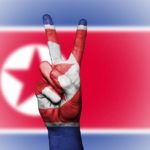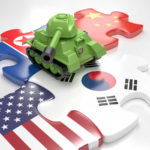Last week President Trump warned North Korea to discontinue threats against the United States or “They [North Korea] will be met with fire and fury like the world has never seen.” The next day, North Korea threatened to launch four ballistic missiles into the sea to create “an enveloping fire” around the U.S. territory of Guam and to potentially unleash a pre-emptive military strike on the U.S. mainland.
Since the 1953 Korean Armistice Agreement and the setting up of the Korean Demilitarized Zone between North and South Korea, the United States and other nations have gone round and round with North Korea over their nuclear program and intentions. Examples of failed foreign policy attempts include the 1994 Agreed Framework and the collapse of the Six Party Talks between the United States, North Korea, South Korea, Russia, Japan, and China in 2008. Not only has North Korea deceived these nations time and again, but it has defied the United Nations and put the world in a precarious spot. (For an insightful history of North Korean negotiations with the United States and posturing from 1953 to the present, click here.)
So, how do we make sense of recent impasses, anger, rhetoric and the possibility of war? In other words, politically and biblically, what’s going on?
First, it is important to understand that North Korea, led by Kim Jong-Un, still believes that it is at war with the United States and our allies because an official peace agreement has never been ratified, only the 1953 armistice. To this day North Korea fully believes that the entire Korean Peninsula belongs to them.
Second, Donald Trump is implementing the exact approach he said he would carry out concerning North Korea for the last 18 years. In 1999, he told CNN’s Wolf Blitzer, “You go in; you start negotiating. And if you don’t stop them from doing, you’ll have to take rather drastic actions. Because if you don’t take them now, you’re going to be in awfully big trouble in five years from now when they have more missiles than we do.” In that interview, he advocated the possibility of a unilateral pre-emptive military strike against North Korea’s nuclear reactors, and he noted that such action is the only thing that North Korea fears.
Likewise, in a 1999 interview with Tim Russert, the moderator of NBC’s Meet the Press, Trump said:
First, I’d negotiate. I’d negotiate like crazy. And I’d make sure that we tried to get the best deal possible. These people in three or four years are going to be having nuclear weapons. They’re going to have those weapons pointed all over the world, and specifically at the United States. And wouldn’t you be better off solving this really potentially unbelievable [problem]. … And wouldn’t it be good to sit down and really negotiate something? Now, if that negotiation doesn’t work, you better solve the problem now than solve it later, Tim. And you know it, and every politician knows it, and nobody wants to talk about it . . . . Do you want to do it in five years when they have warheads all over the place, every one of them pointing to New York City, to Washington, and every one of our—is that when you want to do it? Or do you want to do something now?
Third, it is plausible that by presenting war with North Korea as a legitimate option to resolve this conflict once and for all, President Trump is actually trying to persuade China to take action against North Korea!
North Korea, partially because of all the sanctions against it, can only survive because of its relationship with China. Gordon Chang, author of The Coming Collapse of China, has argued that China has “a stranglehold over the North Korean economy,” writing, “China accounts for more than 90 percent of the North’s external trade. It provides more than 90 percent of North Korea’s oil, much of it on concessionary terms. Some years, China is the source of 100 percent of the North’s aviation fuel.” China also supplies one third of North Korea’s food and at least half of all foreign investment in North Korea.
In his article, “Evaluating the North Korean Crisis,” Tim Zebell summarizes this position by stating, “Knowing that China stands to lose the most in any military conflict with North Korea, and knowing that they are also the best positioned to negotiate with North Korea, President Trump appears to be focusing his effort to convince China of the gravity of the situation. And there are positive indicators that this strategy is succeeding. For the first time, China has unofficially spoken of remaining neutral if the U.S. retaliates to an attack by North Korea, and China has indicated that it too is getting frustrated by North Korea through its vote with the United Nations Security Council to impose greater sanctions.”
Fourth, whether we look at the present North Korean crisis, the race riots in Virginia last weekend, or many other issues consuming our nation, it is clear that America is a troubled nation. By studying the Scriptures, we see that nations that depart from God’s will and ways are the very nations that are confronted with numerous challenges. Often these include the loss of life and liberty (See 2 Chronicles 15:5-6). We should not be so short-sighted as to believe that if we can simply get past this situation with North Korea, then life can return to “normal.” It is my belief, in light of our national waywardness, that we should not expect less situations like this in the future, but more. Apart from a deep national repentance, our nation is likely to experience increased turmoil as God endeavors to awaken us out of our spiritual complacency.
If this is what is taking place politically and biblically, then how concerned should we be over the prospect of war with North Korea?
To be continued…
For a detailed look at the premises of this blog, with accompanying sources, click here to read Evaluating the North Korean Crisis by Tim Zebell.








